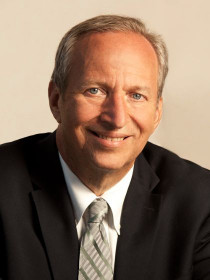
Lawrence H. Summers
Connect with Lawrence
About Lawrence
Summers’ research has made important contributions to many areas of economics, including public finance, labor economics, financial economics, macroeconomics, global economics, economic demography, economic history and development economics as well as global health and education. During the past two decades, Summers has served in a series of senior policy positions in Washington, DC, including the 71st Secretary of the Treasury for President Clinton, Director of the National Economic Council for President Obama and Vice President of Development Economics and Chief Economist of the World Bank. In his speeches, regular newspaper columns, and public commentary, Summers continues to move forward the debate on national and global economic policy.
Contributions
Why Now is the Right Time for a U.S. Carbon Tax
In the News
Publications
Outlines and discusses the policy implications of three economic concepts: Keynes’s view that the liquidity trap, or zero bound on short-term nominal interest rates, can sharply limit the efficacy of monetary stabilization policy; President Kennedy’s “Economics 101” view of the desirability of fiscal stimulus during a slump; and the possibility that a prolonged episode of weak demand and high unemployment in an economy may have destructive consequences for aggregate supply.